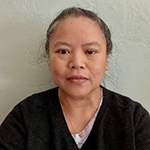Dear Anna: Letters to my Ex-Metamour
metamour (noun): in a polyamorous relationship, one’s lover’s lover
Dear Anna–
Do you remember when we went to see that decaying house near the old part of the highway? We took my car because it had four-wheel drive, and we did it in broad daylight because we figured nobody knew who was or wasn’t supposed to be there, anyway. You were braver than I was and went inside to explore the old kitchen, the peeling tiles. On the way out you gave me bad directions and I ran us into a ditch.
We stood on the side of the road in our polka-dot dresses, too afraid or too bold to call your fiancé, who was also my boyfriend. We were so sure we could get out of it on our own. Everybody stopped to see if we were okay and we smiled at every single one of them: the truckers, the cops, the couple across the street who stayed on their porch watching out for us for forty minutes. It was all so very Southern.
Eventually, we did get home. He had slept through the whole thing, but we knew we still had to say something. “I can’t believe we drove into a ditch!”, you and I had been laughing in the car.
“Allison got us stuck,” you said to him then.
I’m marrying him in fifty-three days and I still don’t know if I’m sorry.
Dear Anna–
The word, you told me, was metamour. That is what you call the person who is dating the same person you are. This is what good polyamory looks like, you said. You have to unlearn everything toxic. Us, we’ve let go of the idea that we can possess other people. We’ve let go of jealousy. We have no purpose for that obnoxious couple thing where people refer to each other in the plural. “We think.” “We want.” “We are.”
Look at us, you said. It’s all about open and honest communication. What the agreements are. What makes us insecure. You work it out. Look at us. We’re best friends. We’re exactly what metamours should be.
Dear Anna–
Do you remember the poem I wrote about you lying on the couch with your tears stuck to your eyelashes, and how you wanted to show it to the man in Florida you were leaving us for? That really is how I remember you, most days. It’s hard—I saw it coming for so long, your sadness, but I still didn’t do anything to stop it.
Could I have, if I tried? If I had left, would you have been happy? I don’t think so. I’m still not sure.
It’s hard to figure out what was true, if anything was. When I was out of the country, your relationship was so fragile. He said you didn’t touch him for weeks. I had started to see through you by then, and I told him it would all change the day I came back. And sure enough, when I walked in the door to surprise him that morning, the two of you were singing together in the shower.
I always thought it was strange timing, since you were the one who knew when I was coming over.
Dear Anna–
Sometimes I hope you had a secret life, like the hidden cabinet we found after you left filled with trash from Popeye’s, which we didn’t know you even liked. You stored it away so we wouldn’t find out that on your lonely days, you filled his absence with fast food. But I cannot understand why you didn’t just walk it to the trash.
Still, I find myself hoping you had other secrets, hidden like that in compartments that were yours alone to know about. There was a boy at the restaurant you waited tables at that seemed to like you, and I know when your car got repossessed, somebody still had to take you to work. I hope it was him, even though our relationships were supposed to be closed.
“Polyfidelitous.” That’s what we were. A closed triad. So many new words.
The only thing I knew then about your Florida boyfriend was that he liked the poem and didn’t like us. But he got in touch with me a few months ago. He felt like he needed to apologize. He told me he wished he had believed what we were trying to tell everyone about you; he said you had near ruined his life and he’d tell people now too, even though nobody would ever believe any of us.
Dear Anna–
I’m sorry I tried to tell everyone about you.
Dear Anna–
In movies, you always see therapists telling people to write letters they’ll never send, but I’ve never had one say it to me, and I have had so very many therapists. I can’t figure out if doing this is helping or not. Maybe this is a made-up medicine. Maybe you could tell me, if you ever did go to talk to someone about your sadness—but I guess you’re more of an expert on the “made-up” part, right?
When I called you to switch the last of the utilities, we wished each other well. I used to think I could tell your real voice from your fake voice, but now I realize I didn’t know more than anybody else. I really do wish you well. I just don’t know what that means.
I haven’t deleted your number or your email yet, but my best friend tells me I shouldn’t ever send anything like this.
I remember when I would have asked your advice, too. I remember when “best friend” came out of your mouth.
Dear Anna–
I probably should have asked you to explain it to me, you know. How it all works. Nobody really ever did. I watched Big Love and Sister Wives for research, knowing they were amplifications, and sought our personalities in each of the women. I didn’t have any good examples of how it should be in real life except for what this relationship gave me.
It turns out you didn’t have any idea yourself. Or at least, you didn’t adhere to one. I’m sure that at one time you did believe that relationship agreements were binding. Until it didn’t suit you anymore. Until it meant I wasn’t capable of infinite love. Until it meant I was limiting him. Until I was set to move in. Until it meant he’d treat us as equals.
Until it meant something you thought could make me leave.
Dear Anna–
It was Chastity?
How in the fuck do we live in a universe where you convinced him to break our triad with a girl named Chastity?!
Dear Anna–
If you’re wondering where your very expensive vibrator went, he hid it in the dirty laundry basket because he knew that meant you’d never find it.
Dear Anna–
I admit it now: as hard as I tried, I am not polyamorous. I’m not polyfidelitous, either. I can’t even be in an open relationship, much less whatever it is we were trying. I couldn’t do it again.
The hard part is I do believe it works for some people, and so I always wonder if it would have eventually worked for the two of you—three, four, however many at any given time—if I hadn’t come along and wedged myself into those near-invisible cracks between those peeling tiles. But yes, I’ve seen people who it works for, who are crazy in love with all their partners and who get along or who at least don’t pretend…
I see more who pretend. I hate that I have to say that. I see so many who fell for someone before they knew the preexisting conditions. Groups where one person is unhappy and poison. Where everybody knows someone is miserable, and maybe they even like it. Maybe they’re even trying to make it worse, just so they can be the partner who stays the longest. I’ve had people we knew confess to me so often since they heard: they don’t want to do this anymore, but they’re too afraid to admit it.
When are you going to admit it too? When are you going to admit that you always have to be pushing someone out, just so you know you can win?
Dear Anna–
“How did you make him be monogamous?” is a question people really ask me, as if he didn’t have a say in the manner, as if I have some manipulation or magic trick that will work for their own failing arrangements. The truth is it isn’t that complicated. “If Anna leaves,” I told him one day, “I need you to not replace her with someone. I need it to be just us, or else I need to go.” I feel like you could have told him this at any point too, but you didn’t. Why is it so hard to tell each other what we need?
Maybe I said, “When Anna leaves.” I don’t remember anymore.
Dear Anna–
Sometimes I see you write online about how your relationship was so toxic, and I get angry and say you’re lying since I was in the same relationship at the same time and I saw everything, but I have to ask if maybe you did think that and just never told me, and if that’s the case, why not? Did you really think I wouldn’t have done something?
You said I was your best friend.
Dear Anna–
I had this dream where we met at a dance class one day and I found you annoying and you found me exhausting and we didn’t like each other and then we never spoke again and you were gone before I ever met him.
Dear Anna–
I had this dream about you. We were driving to Virginia in that rainstorm, and we kept driving.
Dear Anna–
I think the best night we ever spent together was when we went to that Mexican restaurant so you could give me back your key. We signed our names together on the bathroom’s neon wall, and I loved you so much. We weren’t in competition and you were so beautiful. We both cried when you had to drive away.
I knew we wouldn’t see each other again. I did think we would keep talking every day. And for a few months, we did. But without the competition, it all fell apart, and I kept learning more and more at home.
Why did you do it? Convince him to cheat on me, I mean—to do what you knew was outside of bounds.
Was it possible for him to cheat on one of us, and not the other?
How much did Chastity know?
Don’t answer that.
Dear Anna–
You still owe us nearly five thousand dollars.
Dear Anna–
Even though we never dated, I’m realizing I need to treat you like an ex. The me that existed back then loved the you that existed back then, and even if I were to get closure now it wouldn’t be from the same person.
I still need closure.
Did you ever love me?
Dear Anna–
I still need closure.
Why did you do it?
Dear Anna–
I have a secret.
When it all went to Hell, I was in St. Louis at a bar.
I hadn’t broken our polyfidelity yet. I may have later that night. Instead, I saw those missed calls from both of you at once, and I turned to the guy who was pushing an orange slice into my next Blue Moon, and I said, “I’m sorry, but can you take me back to my car? I think my boyfriend’s fiancée just left him.”
Dear Anna–
Here are the five traffic tickets and the court summons that got sent here for you. I’m sending them because I don’t want anyone to come bang on our door looking for you, and not because I still care.
Dear Anna–
You’re monogamous now. (Yes, I occasionally check.)
You have a dog.
You have a house.
You’ve deactivated almost all your old social media.
You said goodbye and “thank you to everyone who was a part of that time in [your] life.”
Anna, do you feel any gratitude towards me, or anything else at all?
Dear Anna–
Do you know how concerned you looked when you told me what had happened with Chastity while I was gone, and how gentle you were while I sat there crying in your arms? You said you were so torn up about helping him lie to me that you hadn’t been able to touch him for weeks. You consoled me and told me you would support whatever choice I made. You said that we’d always be friends. You told me she was manipulative and that she had blinded you, too, but now you saw you never should have been friends with her and you were so, so sorry.
When you handed me the key, you told me to look for her love letters under the bed.
He told me he didn’t know they were there.
Dear Anna–
I wish I’d been louder about it all, for the sake of the poor girlfriend of the man you met next.
Dear Anna–
You do realize it was your leaving that made it final, right? That you handed me the thing you really wanted?
He told me how you and Chastity sat down with him, the weekend she was in town, and told him if he wasn’t willing to date her too, then I really must be controlling everything. That he was weak. That he wasn’t asserting his needs.
And I know, I know, I should be mad at him for cheating on me, for breaking those rules. And I was. And I am. And I continue to be.
But you knew what you were doing, too.
He was gentle about it, you know. He didn’t tell me it was you who encouraged it until I started to realize how rotten things were between us. Until one day you just never replied to my text ever again. Until you’d already started to call someone else your best friend. He tried to protect you. Me, too.
Did you ever tell him what you really wanted?
Does everyone look weak to you, Anna? What do you think of yourself, if you ever do?
Dear Anna–
Whenever I tried to tell our side of the story, people said to stop airing dirty laundry.
Dear Anna–
Sometimes I search your name on the internet, and the articles come up about that author who just came out with her second best-seller. The first time I saw them, I wondered if you had stolen one of my dreams just because I had stolen one of yours.
Dear Anna–
Sometimes I search your name on the internet and see your posts to Chastity about how much you miss her.
Dear Anna–
Thank you. Thank you. Thank you. You knew how much I loved him, and leaving so we could be together in the way I needed was the nicest thing anybody’s ever done for me. I can’t be grateful enough. I am so happy now. He treats me differently these days. I feel like I need to tell you: things are different.
Not that things were bad when you were around—God, do you remember when the three of us went to see the Muppets? How we made fun of everybody we hated together, and we sang musicals together in the car, and we held hands over the popcorn? How we didn’t care if anybody saw?
I’m really sorry for everything I’ve said about you being a liar and lazy and a bitch. It was a bad situation for you. You were actually the better friend. I could have left for your sake, but I didn’t. I don’t think you’re as awful as this makes you look.
To me, I mean. To everyone else, you look happy.
Anna, have you ever been happy?
Dear Anna–
When I told you I liked how your head looked shaved, I lied.
Dear Anna–
I miss you. Please miss me back.
Dear Anna–
I still don’t understand. Please tell me somebody else made you do it. Please tell me you were sick. Please tell me you were confused. Hell, tell me he made it all up. Just tell me you didn’t actually engineer a situation specifically in order to hurt me.
At the very least, tell me you’re sorry.
Dear Anna–
Sometimes when there’s a snowstorm, I wonder when you’re going to wake up from where you would fall asleep face-down on the bed. I wonder when you’ll come down the stairs in your red footie pajamas, and when you’re going to convince me to go back out to make snow angels. I save the last spoon of cookie dough ice cream for you. I sing the song I wrote about kissing the top of your head. Maybe we’ll trade corsets. Maybe we’ll go to Walmart in our tutus. Maybe we’ll bake something. Dear Anna: do you want to come over?
Dear Anna–
Was any of it real?
Dear Anna–
Do you know how much I hate you?
Dear Anna–
Are you doing all right?
Dear Anna–
It’s been five years since I first put these on paper. I still write more letters. And then I write more.
I still don’t trust him. I’d never trust you. I’m glad you got to get married. I hope you love someone you can trust.
I’m still trying to make something beautiful from what you left me, something that hurts in the truest ways. I miss you more than anyone I’ve ever lost. I think of texting you all the time.
I love you in that way that we once were. I don’t think I know what was real.
I hope you’re a better person now. I wish we’d met in a different way.
And I think if we had—
And I think if things had gone differently—
And I think if we were in touch—
But it doesn’t matter. I just hope you’re happy.
I do. I do. I do.
Allison Darcy is a disabled Jewish writer currently based in North Carolina. Her fiction has been published with Catapult and took first place in the 2020 North Carolina Fiction Contest, and her Pushcart Prize-nominated essays have appeared in such publications as Words and Sports Quarterly, Nat. Brut., Alma, and the Eastern Iowa Review. She holds an MFA in Fiction from North Carolina State University and can be found at allisondarcy.com and/or obeying the whims of her 50-pound lapdog, Freyja. Photo by Angel Alberto.


 BACK TO ISSUE
BACK TO ISSUE



